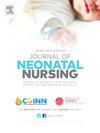从新生儿重症监护室出院的母亲及其高危新生儿的数字健康干预:系统回顾和荟萃分析
Q2 Nursing
引用次数: 0
摘要
数字卫生技术在新生儿护理中至关重要,可帮助母亲管理新生儿重症监护室出院后的健康。这些技术有助于监测和支持医学上复杂的新生儿。本综述探讨了移动健康干预对高危新生儿临床结局及其母亲在新生儿重症监护病房出院后心理结局的影响。从2011年到2024年3月,使用特定关键词检索了7个数据库。采用Rayyan软件筛选纳入研究,采用RevMan 5.4进行meta分析。纳入的随机对照试验(rct)的质量使用Cochrane风险偏倚工具(rob2)进行评估,而ROBINS-I工具用于非随机研究。搜索发现了1164篇文章;最后,21项研究(16项随机对照试验,5项非随机对照试验)纳入数据综合。确定的数字健康策略包括移动健康、电子健康、远程医疗、电话提醒和短信。叙事综合的10项研究表明,新生儿结局得到改善,如生长、发育、母乳喂养率、免疫接种和再入院率降低。荟萃分析中的11项研究表明,产妇压力显著减少,新生儿护理能力增强。然而,产妇满意度在两组间无显著差异。该审查强调了对母亲进行数字技术培训和实施面向数字的干预措施的重要性,以支持特别是在低收入和中等收入国家从新生儿重症监护病房出院的高风险新生儿的母亲有效利用数字卫生干预措施。本文章由计算机程序翻译,如有差异,请以英文原文为准。

Digital health interventions for mothers and their high-risk neonates discharged from NICU: A systematic review and meta-analysis
Digital health technologies are crucial in neonatal care, aiding mothers in managing the health of neonates post-NICU discharge. These technologies help monitor and support medically complex neonates. This review examines mHealth interventions' impact on high-risk neonates' clinical outcomes and their mothers' psychological outcomes at post-NICU discharge. Seven databases were searched from 2011 to March 2024 using specific keywords. Rayyan software was used to screen the included studies, and RevMan 5.4 was used to perform meta-analysis. The quality of the included randomized controlled trials (RCTs) was assessed using the Cochrane Risk of Bias Tool (RoB-2), while the ROBINS-I tool was used for non-randomized studies. The search found 1164 articles; finally, 21 studies (16 RCTs, 5 non-RCTs) were included in data synthesis. Digital health strategies identified were mHealth, e-Health, telemedicine, phone reminders, and text messages. 10 studies in the narrative synthesis showed improved neonatal outcomes, such as growth, development, breastfeeding rates, immunization, and reduced readmission rates. Eleven studies in the meta-analysis indicated significant reductions in maternal stress and enhanced competence in neonatal care. However, maternal satisfaction did not differ significantly between groups. The review emphasizes the importance of training mothers in digital technology and implementing digital-oriented interventions to support mothers of high-risk neonates discharged from NICUs, particularly in low- and middle-income countries, for effective utilization of digital health interventions.
求助全文
通过发布文献求助,成功后即可免费获取论文全文。
去求助
来源期刊

Journal of Neonatal Nursing
Nursing-Pediatrics
CiteScore
2.00
自引率
0.00%
发文量
143
期刊介绍:
Aims & Scope: This is the practical, bimonthly, research-based journal for all professionals concerned with the care of neonates and their families, both in hospital and the community. It aims to support the development of the essential practice, management, education and health promotion skills required by these professionals. The JNN will provide a forum for the exchange of ideas and information between the range of professionals working in this field; promote cooperation between these professionals; facilitate partnership care with families; provide information and informed opinion; promote innovation and change in the care of neonates and their families; and provide an education resource for this important rapidly developing field.
 求助内容:
求助内容: 应助结果提醒方式:
应助结果提醒方式:


